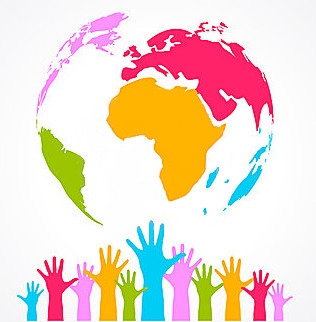Volunteering is the practice of people working on behalf of the well-being of the society without expecting any financial gain or any other kind of benefits. Volunteering is an altruistic activity which aims to promote the goodness of the society and improve the human quality of life.
 According to the definition adopted by the United Nations General Assembly in 2001: Firstly, the action should be carried out voluntarily, according to an individual’s free will, and not as an obligation stipulated by law, contract or academic requirement. Secondly, the action should not be undertaken primarily for financial reward. Thirdly, the action should be for the common good. It should directly or indirectly benefit people outside the family or household or else benefit a cause, even though the person volunteering normally benefits as well.
According to the definition adopted by the United Nations General Assembly in 2001: Firstly, the action should be carried out voluntarily, according to an individual’s free will, and not as an obligation stipulated by law, contract or academic requirement. Secondly, the action should not be undertaken primarily for financial reward. Thirdly, the action should be for the common good. It should directly or indirectly benefit people outside the family or household or else benefit a cause, even though the person volunteering normally benefits as well.
The most important feature of this activity is that the person who is performing it, i.e. the volunteer, is acting on free will and is not motivated by any kind of payment or return. Though volunteers are not paid for the job that they do in most projects travelling and accomodation costs, plus expenses for the job are paid by the volunteering institutions or sponsors.
In return, volunteering has many personal benefits for the individuals, such as producing a feeling of self-worth and respect, meeting people, finding friends, discovering new cultures and places, reaching out to the community, learning new skills, boosting CVs, even advancing one’s career, and even helping find better future jobs. Volunteering can also help protect mental and physical health.
Many volunteers are specifically trained in the areas they work, such as medicine, education, or emergency rescue. In fact, traditional volunteering is defined as not requiring any specific training or special skills. There may be training for the job or on-the-job-training.
Volunteers are combatting depression in the first instance needed in all parts of the world, almost everywhere; but developing countries are more in need of volunteers. An increasingly popular form of volunteering among young people, is to travel overseas to communities in the developing world to work on projects. Countries in Africa, East Asia and South America attract volunteers the most.
Activities volunteers involve in developing countries include teaching languages, working in orphanages, conservation, in health issues, the protection of environment and so on.
One can start a volunteering project with his own resources and budget, or fundraise for his projects or can apply to work for an existing project in need of volunteers. Non-profit organizations, NGOs and corporates are promoting volunteering projects all around the world. There are institutions and web pages that match organizations seeking volunteers and people looking for volunteer jobs.
With the increase of use of computers and internet nowadays more and more people are working for virtual volunteering jobs which enables them to participate in projects with their limited time and mobility. Online volunteering has eliminated the need for volunteerism to be tied to specific times and locations, thus greatly increasing the freedom and flexibility of volunteer engagement. This kind of volunteering includes translating documents, researching subjects, creating web pages, writing or editing documents, tutoring or mentoring students, managing online volunteers etc. Wikipedia is an online volunteering project created via crowd sourcing.
In addition to traditional voulnteering other types of volunteering include Internship/ gap year volunteering, micro volunteering, voluntourism and corporate volunteering. Volunteers work for environment, education and literacy, protection and well being of animals, homeless, conservation, elderly, fundraising, legal aid, health issues like prevention of epidemics, vaccinization, addictions, hospital work, refugees and asylum seekers, disabled etc.







